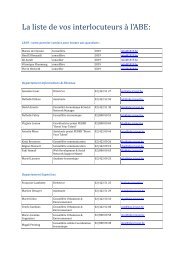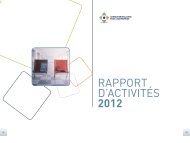BRUSSELS SOFTWARE CLUSTER - Bruxelles Invest & Export
BRUSSELS SOFTWARE CLUSTER - Bruxelles Invest & Export
BRUSSELS SOFTWARE CLUSTER - Bruxelles Invest & Export
Create successful ePaper yourself
Turn your PDF publications into a flip-book with our unique Google optimized e-Paper software.
4<br />
SOFTwARE IndUSTRy<br />
In the BruSSelS-CapItal<br />
regIon<br />
<strong>SOFTWARE</strong> IN <strong>BRUSSELS</strong><br />
he Brussels-Capital region with its central location<br />
in Europe has an intensive economic activity<br />
(Brussels produces about 20% of the Belgian<br />
gross national product). The Region has about<br />
one million inhabitants (about 9% of the population<br />
of Belgium) of whom approximately 40% are<br />
non-Belgians. Even though Brussels has a total<br />
surface area of 162 km² (about 0.5 % of the total<br />
area of Belgium) and about one-third of Belgium’s<br />
global ICT activities is concentrated in the region.<br />
Brussels-based ICT companies have a proven track<br />
record of delivering state-of-the-art solutions that<br />
are commercial winners and a particular success<br />
with applications for niche markets. The ICT sector<br />
in Brussels is significantly growing with the presence<br />
of large ICT multinationals as well as many<br />
small high tech companies. As Capital of Europe,<br />
Brussels offers real business opportunities to its<br />
ICT companies. The dynamism of the ICT sector in<br />
Brussels also results from a proactive approach<br />
developed by the Region in order to support innovation,<br />
competitiveness and employment.<br />
the ICt Sector in Belgium and<br />
the Brussels-Capital region<br />
ICT companies significantly contribute to a country’s<br />
economy, either directly or indirectly. They<br />
lead to the creation of jobs and increases in productivity,<br />
added value and exports. As such, in<br />
Belgium the ICT sector’s contribution to growth is<br />
estimated at 20%. About one third of this percentage<br />
is generated in the Brussels Region, which has<br />
unique growth potential thanks to the high concentration<br />
of ICT companies and its central location<br />
in Belgium.<br />
The ICT sector in Brussels is clearly growing.<br />
According to Agoria, the ICT sector in Brussels<br />
hired actually 20.000 people, which accounts 5 % of<br />
jobs in the private sector and the job opportunities<br />
have increased of 11% which is relatively more than<br />
in the two other regions.<br />
The Brussels regional government strongly supports<br />
the ICT sector in Brussels, and the region’s<br />
Contract for Economy and Employment designates<br />
the ICT sector as one of the three key innovative<br />
sectors in Brussels.<br />
As indicated in the Regional Plan for Innovation, the<br />
ICT (Information and Communication Technologies)<br />
business unit of the Brussels Enterprise Agency<br />
has been requested by the Brussels Region to set<br />
up and manage clusters in order to increase synergies<br />
between the different ICT players.<br />
A global, coherent ICT policy focused on training<br />
ICT professionals through the creation of the ICT<br />
reference centre “Evoliris”, the strengthening of<br />
financial aid and reduction of taxes (elimination of<br />
the PC tax), accompany these actions.<br />
the Software Industry<br />
The software industry is composed of all the companies<br />
that develop and market software. In general,<br />
it includes software production and software<br />
distribution but may also incorporate software services<br />
such as consulting, documentation, training<br />
and maintenance. Software product firms earn at<br />
least 60 to 80 % of their revenues from developing<br />
software, licensing it for sale and receiving maintenance<br />
fees for updating that software.<br />
The software industry is divided in two big categories:<br />
systems and application software. Systems<br />
software includes operating systems (bios, desktop<br />
environment), network and database management,<br />
devices drivers, development tools (text editors,<br />
debuggers, compilers, etc), programming languages,<br />
and other systems software. Application<br />
software comprises general business productivity<br />
(ERP, CRM, SCM, etc) and home use applications,<br />
cross-industry and vertical market applications







